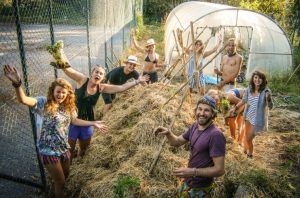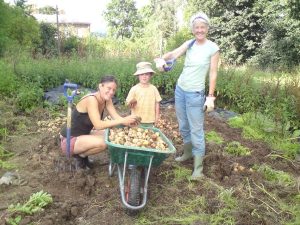Are you a remote worker dreaming of pastures new? WWOOFer Imogen shares how her experience of WWOOFing as a digital nomad enabled her to combine making a living with meaningful volunteering.
With the Covid-19 now over a year old, some aspects of life that have been transformed by the pandemic may turn out to be permanent, or more longer-lasting than we might have thought this time last year. For many, huge changes in the way we work have occurred, and lots more of us are now working online from home. If all your meetings are now web conferences, and you don’t have to commute into the office, there’s a great possibility to make the most of this new freedom and flexibility.
The term “digital nomad” might conjure up images of a travel blogger hitch-hiking around the world and managing to make a living off it, or an influencer whose #vanlife lifestyle earns them social media fame and fortune. But with the changes to the way we’re working, there are other ways to be a “digital nomad” that can combine making a living with meaningful volunteering and support of alternative, sustainable lifestyles.
My experience is perhaps unusual in that my job was 100% online and remote even before the pandemic hit. There are increasing numbers of jobs like this, or your existing job might have transitioned to remote working.
I partly chose to work online precisely because of the freedom of movement it offered. I was planning to take my job on the road, dreaming of travelling the world while earning my living! Then Covid struck and there was no longer the option of taking my job with me to Montevideo or Zagreb. Instead I found a really worthwhile way to utilise the flexibility of my job within the restrictions of lockdown, by WWOOFing close to home.
It must first be stated in huge, bolded letters that if you want to work online while WWOOFing, this absolutely MUST be discussed with your host before-hand. After all, the crucial give-and-take of help between host and volunteer is the most important thing about WWOOFing, and a balance must be struck that everyone is happy with. If you need to be at your desk 40 hours a week, then WWOOFing simultaneously probably isn’t going to be an option for you!
But if, like me, your job is part time with flexible hours, there is so much scope to combine it with WWOOFing. Thankfully much of the country even in rural areas has excellent broadband connectivity – though this is something you should make certain of before you arrive at your host’s with your laptop under your arm!
My experience has shown how well digital working can fit into WWOOFing, with a flexible attitude between host and volunteer. Some days when the weather is inhospitable it makes perfect sense to be using that time to be doing desk work, and with working hours scattered throughout the week there’s usually plenty of time during the day to be out in the veg patch in between meetings. This matches the general flexible mindset of smallholding life and organic growing which requires adapting to conditions as they arise, and prioritising tasks that present themselves, rather than sticking to a rigid plan.
It helps that my host is also a remote worker, so we can both organise our schedules of meetings and catching up on emails at compatible times. Someone has a meeting close to lunch time? Then the other person can be the one on lunch duty! Someone has a busier few days than usual coming up? They can make up the time later in the week while the other person attends to the tasks outside. There’s lots of ways to make it work for everyone involved, as long as there is clear and honest communication about everyone’s requirements and expectations.
WWOOFing while working has proven to be amazing, and so rewarding. It has allowed for the “good life” of living on the land in a sustainable community of like-minded people, without needing to take the plunge of quitting a career or taking a sabbatical in order to do so. It’s the kind of balanced, flexible and mutually beneficial way of life that the rupture of the pandemic will hopefully be a catalyst for allowing more of us to adopt.
WWOOFer Imogen spent both lockdowns WWOOFing at a host smallholding in the Midlands. Find the original post here on the WWOOF UK blog.
 About the author: WorldWide Opportunities on Organic Farms UK (WWOOF UK) is part of a worldwide movement linking visitors with organic farmers and growers to promote cultural and educational experiences based on trust and non-monetary exchange, helping to build a sustainable global community.
About the author: WorldWide Opportunities on Organic Farms UK (WWOOF UK) is part of a worldwide movement linking visitors with organic farmers and growers to promote cultural and educational experiences based on trust and non-monetary exchange, helping to build a sustainable global community.







